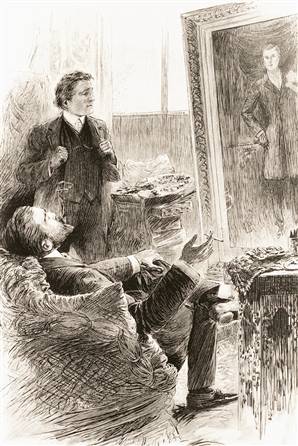 |  |
My Kindle broke on me me while I was in Madrid (am I the only person who has trouble with them?), so I picked up The Picture of Dorian Gray in the English language section of a local bookstore. It's Oscar Wilde's only known novel, and it always seemed to me like one of Those Books that Everyone Read in High School and Actually Liked. The thing is, we only read books my George Orwell at my high school. Mrs. Matthews failed to tell us that Animal Farm was actually about Stalin-era Soviet Russia, not just a story about talking pigs and horses.
The first fifty pages of Dorian Gray took forever to get through because I was stopping at practically every paragraph and underlining another clever / wise / witty quote that I wanted to remember. The hedonistic Lord Henry (or Colin Firth, for those of you who have seen the movie) is meant represent a typical dandy of late-19th century Victorian England. Although he's used as a symbol of the over-indulgence and superficiality of that culture, can I admit that he was my favorite? His opinions are so over-the-top and entertaining that it's no wonder Wilde is one of the most highly quoted people in the history of the English language. A favorite:
Ah! Realise your youth while you have it! Don't squander the gold of your days, listening to the tedious, trying to improve the hopeless failure, or giving away your life to the ignorant, the common, and the vulgar. These are the sickly aims, the false ideals of our age. Live! Live the wonderful life that is in you! Let nothing be lost upon you. Be always searching for new sensations. Be afraid of nothing.
For those of you who haven't read it, the story is this: Dorian Gray is a young, beautiful man who becomes the subject of a painting by the artist Basil Hallward. While sitting for Basil, Dorian meets Lord Henry, who preaches a "new hedonism," in which beauty and fulfillment of the senses are the only things that matter. He reminds Dorian, "when your youth goes, your beauty will go with it, and then you will suddenly discover that there are no triumphs left for you." Dorian is profoundly affected by Lord Henry's words, and after seeing the beautiful portrait of himself, muses:
I am jealous of everything whose beauty does not die. I am jealous of the portrait you painted of me. Why should it keep what I must lose?...Oh, if only it were the other way! If the picture should change, and I could be always what I am now!
Dorian's wish comes true and, as his morals grow looser and he begins to act in selfish, heartless ways, the portrait becomes an older, uglier, tormented picture of himself. Meanwhile, the person of Dorian remains ageless. Wilde's novel is a haunting, gripping book that remains a page-turner a hundred years after its publication. Also: the themes of a society's over-reliance on beauty and youth are no less accurate today. For those of you who also were stuck with allegory-free Animal Farm in 10th grade: here's your redemption.










0 comments:
Post a Comment